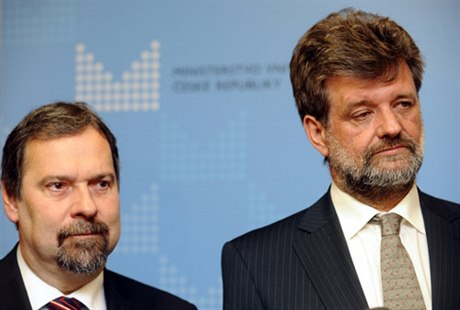In an ironic twist, the Czech Ministry of Interior (MV), which is responsible for coordinating the use of European funds aimed at improving state administration, is under the spotlight itself for serious flaws in the way those funds are being managed.
These problems were highlighted last week in a report to the government that Czech Position has seen. It warns that several hundreds of millions of crowns earmarked for the Czech Republic could be withdrawn due to delays in implementing some projects.
The funds at risk are linked to two operational programs: the Integrated Operational Program (IOP) and Human Resources and Employment (HRE). The ministry says blame for the delays lies not with itself but with other state institutions, regions, and local councils that were supposed to carry out the projects on the ground.
The EU cash forms part of a wider Smart Administration initiative aimed at encouraging more efficient state administration. While the MV boasts on its website that Czech administration is “primarily conceived as a service to citizens, fulfilling the principles of good governance, working effectively and efficiently, ” most Czechs would probably beg to disagree. The slow, surly and shoddy state apparatus is one the most frequently cited bugbears in the country.
Funds for Smart Administration initiatives amount to billions of crowns, with one of the main tasks being the creation of six basic registers, or databases, that would save citizens from seemingly endless paper chases between state offices. Time could theoretically be saved when they are in place with, for example, an address change notified to one office shared with all the others automatically.
The material submitted to the government about how the Smart Administration initiative is panning out locally points out more than 20 projects that have run into, yes, administrative problems. These problems have been identified:
- Flawed organization of tenders
- Insufficient staff for project teams
- Failure to respect deadlines for program implementation
- Inability to settle payments for set amounts
- Failure to keep to the rules regarding financial resources
- Insufficient communication between different departments
The defects have led to an inability to draw fully on European funds. Here , the report highlights defects with 22 projects totaling Kč 3.3 billion. In spite of this list of failures, the office of Prime Minister Petr Nečas (Civic Democrats, ODS) has not yet determined who is to blame. “It is still too early to say who is responsible for any hold ups in drawing funds or their limited use. The risk has been identified, and it is now up to, not just the Ministry of Interior, but also those who sought funding to get to grips with the faults and remedy them,” Government Office spokesman Jakub Stadler said. Even so, the newly installed Interior Minister Jan Kubice will bear the brunt of sorting out the mess regarding projects aimed at improving state administration. ‘It is still too early to say who is responsible for any hold ups in drawing funds or their limited use.’
As to the six databases at the core of the Smart Administration initiative, only three are up and running. And it is not clear whether they will all be ready for the launch date of the integrated system in mid-2012.
The databases cover a register of inhabitants, separate register of rights and responsibilities, and combined system of registers, implemented by AutoCont and organized by the Interior Ministry; a register of people put together by the Czech Statistical Office (ČSU) with main contractor Adastra; register of territory, addresses and property organized by the Czech Office for Surveying, Mapping and Cadaster (ČÚZK) with main contractor GC System; and the transfer of individual details organized by the Office for the Protection of Personal Data (ÚOOÚ).
The Ministry of Interior and Ministry for Regional Development (MMR), which oversees the use of funds, agree that the blame for the delay is the fact that the competition watchdog, the Office for Protection of Competition (ÚOHS) questioned the way tenders had been drawn up. The MMR and experts also point a finger at frequent changes in government priorities and confusion created by local elections.
Officials, however, maintain that corrections are being made in the system and that the overall process is running okay. But the impression that the Ministry of Interior is at least partly at fault is fueled by the flaws revealed in how the national police force is managed and the problems that frequently crop up whenever the ministry has to deal with other institutions and manage large flows of money.


